AGENCY
The capacity for people to make their own choices.
Jasmine’s business venture with cows and goats One year on from India’s COVID-19 crisis Bangladesh Health Leaders teach invaluable lessons


The capacity for people to make their own choices.

International Australia is ending poverty in developing countries – one family and one community at a time. By providing small loans and other support services to families in need, Opportunity helps them grow their own businesses and generate sustainable incomes so they can lift themselves out of poverty with dignity –creating a new future for generations to come.
On the cover and above: Jasmine managed to get through the pandemic with the help of a small loan and started a small dairy business. Read her story on Page
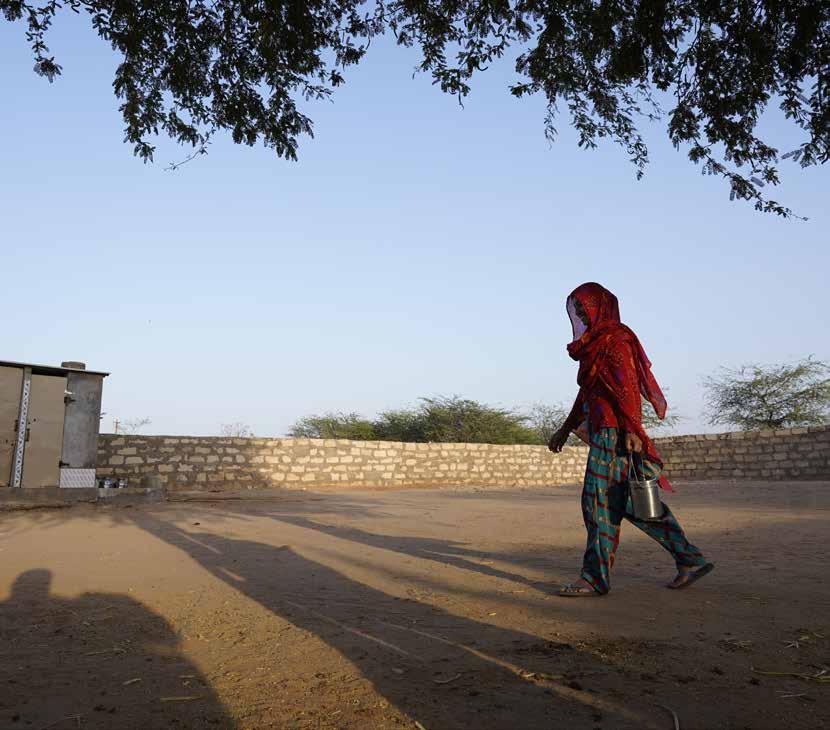
With international borders now open, I was excited to head to India in March and meet some of the inspiring women and their families we stand alongside.
I was both appalled and encouraged; appalled at the magnitude of the challenges and inequality faced by the families we support (and COVID-19 has exacerbated the problem) yet encouraged by the stories of families leaving poverty behind thanks to the generosity of you, our supporters.
It’s hard to fathom how widespread the poverty in India is until you see it first-hand. It’s a complete assault on the senses – your sight, sound and smell. And for so many of us, it’s a hardship we will never endure in our lifetime.
I was inspired to see some of our loan recipients and their businesses in action and thriving. Women like Dalimi.
Dalimi owns a loom and manufactures shawls, saris and clothes. The loom was built by hand with local materials, even the nails have been handmade. Dalimi has become a bit of an icon in her village simply because she was able to start this business, produce shawls, clothes and saris and sell them in the village. She helped get herself and her family out of poverty and is now able to send her children to school. It’s a real success story.
We still wouldn’t want to live in the conditions that Dalimi lives in. But she’s a long way from where she was two or three years ago, before Opportunity arrived and she became aware of the ability to take out a small loan to start her business, which is now absolutely thriving.
There are more than six million women like Dalimi that Opportunity has been able to support with a small loan in the last year, and we love sharing their success stories with you.
Thank you for your ongoing support.
Scott Walters Chief Executive Officer Opportunity International Australia
Above: Dalimi received a small loan through Opportunity and started her loom business, which is now thriving.
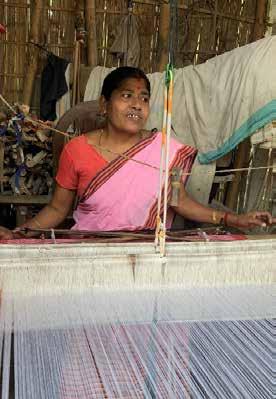
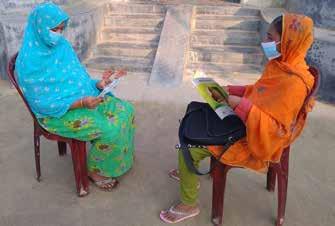
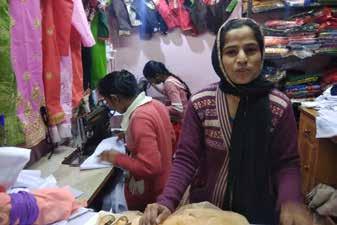
As India once again opens for business, Opportunity will continue to focus on building resilience and supporting low-income communities to protect themselves against future shocks. Many families exhausted what little savings they had or sold assets from their businesses during the pandemic to keep afloat. We are also working with our partners to ensure they are more resilient to future shocks.
People living in low-income communities are less likely to have equitable access to affordable housing, water, sanitation, health services and education, and these services all play a role in helping families to leave poverty behind. We are continuing to enhance the support we offer, based on the needs of the communities we serve, by combining microfinance with access to essential services.
The last two years have shown that our socially-focused MFI partners are among the best placed organisations to provide holistic support to marginalised communities, given their existing presence and networks and the trusted role they play in these rural and remote communities. By taking a multi-dimensional approach to addressing poverty, we can better support those living in poverty to improve their lives and lift their families out of poverty with dignity.
Opportunity International Australia’s health program is being enhanced with three flagship initiatives –Health Leaders, Health Entrepreneurs and Health Finance – to better serve the health needs of lowincome families. These three initiatives work together to improve access to last mile primary healthcare, supporting the communities we serve to develop the ability to seek, reach, pay for and engage actively in their health and wellbeing.
We will train and equip an additional 1,000 Health Leaders to reach new communities, whilst integrating COVID-19 resilience strategies into the Health Leader training curriculum in Indonesia, India and Bangladesh. We will support existing Health Entrepreneurs in India to provide essential health products and services and train an additional 300 Health Entrepreneurs to support their communities while earning a supplementary income.
Our health program will continue to grow in reach and depth of impact as we prioritise primary healthcare access in rural and remote areas, including the provision of diagnostic tools and chronic disease medications. We will continue to leverage Opportunity’s industry-leading microfinance networks to increase uptake of health savings and health insurance options, improving the resilience of the families we serve through Opportunity’s new Health Finance program, starting in 2022 in India.
6,753,480 families accessing small loans and financial services in India and Indonesia
1,478,700 people reached through our health programs in India, Indonesia and Bangladesh
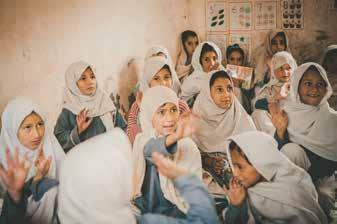
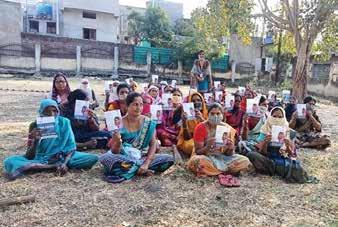
Our Safe Village program in India provides grassroot training in high-risk villages about warning signs of human trafficking, empowering ‘guardian girls’ and ‘informed mothers’ to become agents of change, and encouraging ‘good fathers’ and ‘smart boys’ to protect women and girls in their community. A comic book was used in schools, and during COVID lockdown, short videos were developed for digital training.
As we work towards ending violence against women and girls in all forms, including domestic violence and sex trafficking, Opportunity is working to embed our Women’s Safety initiatives in the operations of our existing microfinance partners across Asia, to further support women living in poverty to improve their lives.
We know that generating an income, running a business and participating in the local economy affords women greater independence, respect and voice, helping protect them from exploitation and abuse.
With Opportunity’s extensive existing networks in India, a large school-aged population, and substantial gaps in the education system, India is a strategic growth area for Opportunity EduFinance. Affordable, independent schools in India need more access to capital to invest in improving infrastructure and facilities in their schools, and professional development training for educators to continue improving the quality of education delivered. Opportunity will partner with five new financial service providers in India to reach an additional 1.18 million children with quality education by 2025.
In Pakistan, there is a massive opportunity to improve access to quality education by linking schools and parents to capital, and offering training to school leaders and teachers. In 2022, Opportunity will be expanding the Education Quality program to support 100-200 schools in the Punjab and Sindh regions. Opportunity aims to reach 1.7 million students with access to quality education by 2030.
Field research indicates that Opportunity EduFinance could achieve significant outcomes for families living in poverty in countries across the region, including Nepal, Myanmar, Indonesia, Bangladesh and Cambodia. Opportunity aims to enable families living in poverty in other countries in Asia to access the benefits of a quality education.
84,470 people educated through the 439 Safe Village programs in India
123,238 families using loans to educate their children in India, Indonesia and PakistanSafe Village program participants. The EduQuality program is expanding in Pakistan
In the last two years, the pandemic has pushed millions of people in India back into poverty. Many of the people we serve through Opportunity International Australia’s small loans have been supported through this time to keep their businesses afloat. Jasmine, one of Opportunity’s loan recipients, has managed to improve her way of life during this time.
Jasmine and her husband Mamad live in a small village in the west of India, in a modest house with two rooms and a kitchen. They both worked as labourers and did not earn enough to cover their basic necessities. Unfortunately, when the COVID-19 pandemic hit, they lost their jobs and had no other source of income.
Through her neighbour, Jasmine heard about small loans being offered by one of Opportunity’s microfinance partners. She applied and received a loan of INR 35,000 ($A626) to open a small grocery shop and purchase a cow and a goat to start a dairy business.
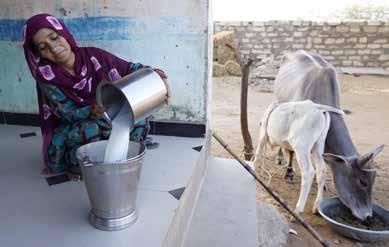
Things were going well but when further lockdowns happened, Jasmine was forced to close her shop. Thankfully she was able to earn an income from selling cow and goat’s milk.
“COVID-19 hit us hard, we had to close the shop as there were no sales,” said Jasmine. “But by farming and selling milk we were able to survive in tough times.”
With the assistance of a small loan, Jasmine and Mamad were able to make ends meet.
“The loan amount helped us to earn a living in the hard times,” added Jasmine.
Her husband has managed to find work again now in farming and construction.
Jasmine’s day begins with cleaning the house and cooking breakfast. She then feeds the cattle and goats and milks them. She then sells the milk to her neighbours and walks into the village to sell more milk to others in the community.
Jasmine and Mamad are earning more money now than they were before the pandemic.
The future is looking bright for Jasmine, as she hopes to increase her dairy business and find more opportunities in agriculture and farming.
Left: Jasmine prepares her milk for sale
Above right: Jasmine’s morning ritual involves feeding the cows and goat before milking them
Right: Jasmine and her neighbour, her first customer of the day

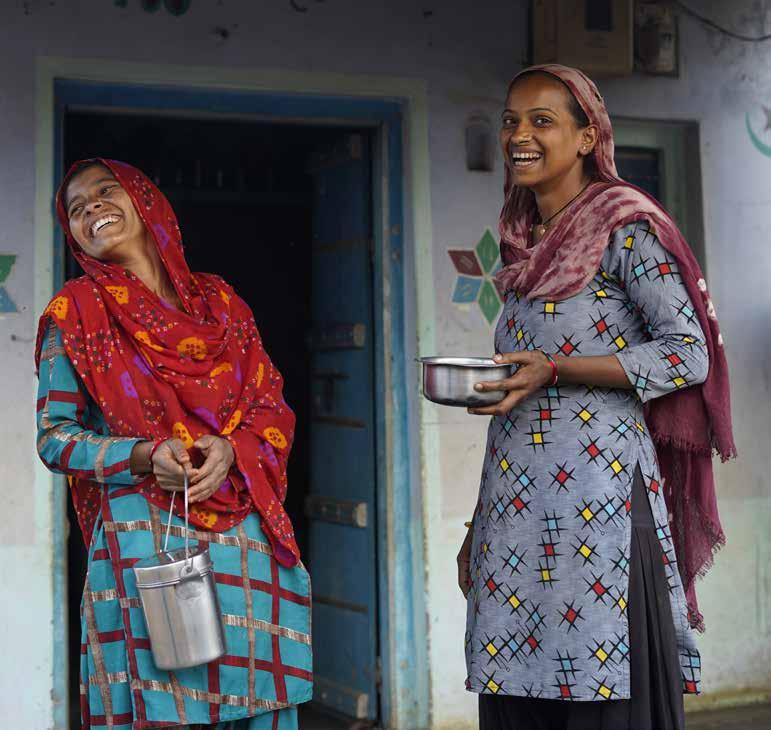
“ The loan amount helped us to earn a living in the hard times.” JASMINE India
In 2021, 550 new Health Leaders were trained in Bangladesh through our programs, serving more than 120,000 people. In September, the first local impact evaluation was produced, measuring the change in knowledge, attitudes and practices based on the 25 modules of health education delivered by the Bangladeshi Health Leaders. The results were impressive, with the greatest improvement in topics involving women’s health - Menstrual and Reproductive Health (50 per cent improvement) and Maternal Health (38 per cent improvement).
Manikjan, a married mother of two, has a strong interest in health issues in her community. In her small village there was no pharmacy and the community had no access to emergency medicine, birth control, feminine hygiene products and vitamin supplements. It is a very long walk to the town with the nearest pharmacy, which many people can’t do.
Manikjan decided to open her own pharmacy to provide the service to her community. She also trained as a Health Leader and offers basic training in maternal health, adolescent health, family planning, infectious diseases and environmental health issues.
The pharmacy has been wonderful for Manikjan, as she can now support her family financially, as well as serving the community with their medical needs.
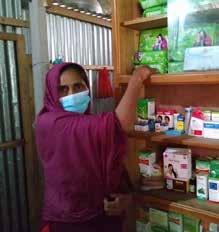
Rojina and her husband have three daughters. Her oldest daughter started puberty early and Rojina didn’t have the right information or advice to give her. Her daughter felt isolated at school and felt she couldn’t participate in games or social events while menstruating.
When Rojina met her local health leader Taslima, she received basic menstrual and reproductive health education, and was able to pass on the knowledge to her daughter. She now knows the basics of menstrual health and how to manage her monthly cycle.
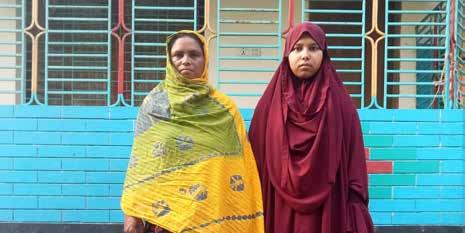
“Now my daughter goes to school, plays with friends, eats nutritious food, and participates in family activities. She is now aware of menstrual and reproductive health and is very happy,” said Rojina.
Laily is married with two sons and lives in very basic conditions. Family and social prejudices combined with shame meant that Laily did not have good knowledge of basic menstrual health. She often suffered from urinary tract infections as she was not using the correct feminine hygiene products. She used antibiotics to treat the infection and often had to go to hospital, which was expensive and beyond their means.
Laily met Co-Health Educator Ashamani, who visited her home each week to teach her about menstrual health. She now understands how to manage her periods and doesn’t suffer infections anymore, and has less financial burdens. She is living a much happier life now.
Here are some of the women and their daughters who have benefited from the program.
Jesmin is married with three daughters and one son. Her second eldest daughter was pregnant and living with Jesmin. A Health Educator Sabina visited their house each week as part of the Basic Health Education Program, teaching them about maternal health. Her daughter gave birth safely by caesarean at a health centre, and Jesmin has been helping her take care of the baby, and has the knowledge now to help with good post-natal care and nutrition.
She has also received helpful education on puberty and menstrual health for her younger daughter.
Kulsum is a mother of an eightyear-old boy and is pregnant with her second child. With her first pregnancy, Kulsum was not aware of services available to her, she didn’t know about how to stay healthy during pregnancy, birth plans, post-partum or newborn care.
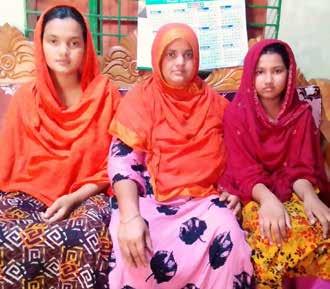
Since being in contact with a Health Educator, Kulsum now has a birth plan, has her hospital visit arranged in readiness for the delivery, and understands the need to rest and take care of her health during her pregnancy. She feels much more confident this time around and has also been educated about birth control following the birth of her baby.
“I came to know about all these things through the training of the Basic Health Education Program,” said Kulsum.
Mithu is a housewife with limited education opportunities after growing up in poverty. When she was pregnant she didn’t know that she should have regular health check-ups and her family thought it was expensive and a waste of money.
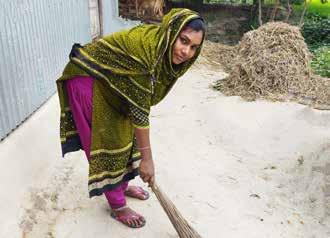
Local Health Leader Sajeda visited Mithu in her home and educated her on basic maternal health and hygiene and the importance of clean water.
Sajeda advised Mithu to visit the doctor for regular check-ups. The information she gained from her visits from the health leader were invaluable and was something Mithu never would have had access to if it weren’t for the Basic Health Education Program.
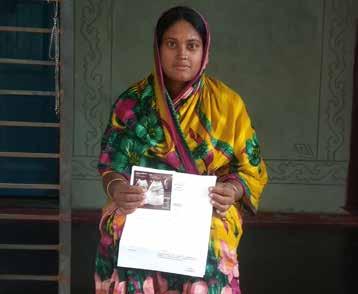
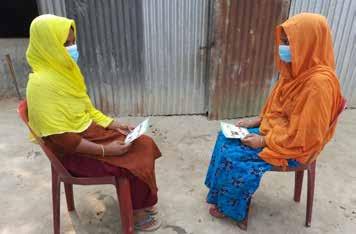
In May 2021, India became the epicentre of the COVID-19 pandemic, recording over 400,000 daily cases and making headlines around the world as the Delta variant and a wide-reaching health crisis unfolded.
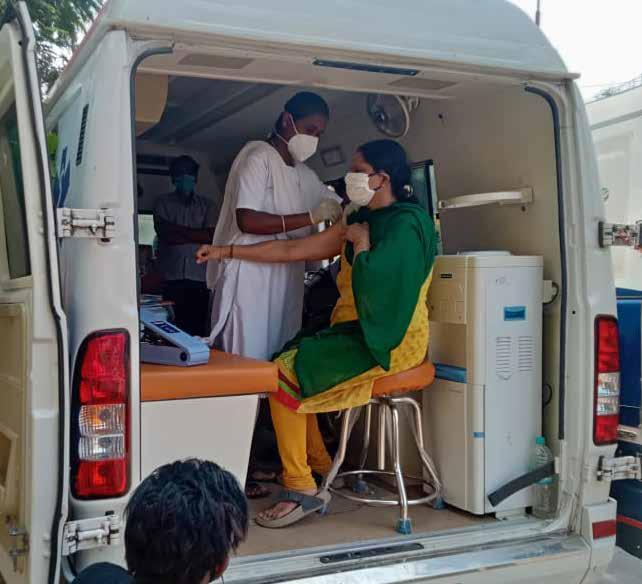
With millions hungry, stranded, sick or unable to isolate safely, the COVID-19 crisis spread from cities to rural areas with a lack of health resources and access to care, leaving some of India’s poorest communities vulnerable and their essential health systems decimated.
In response to the escalating health crisis, Opportunity International moved quickly to mobilise our existing relationships with microfinance institutions in the community and ease the pressure on India’s existing health services by providing relief to those hardest hit by the virus’ second wave of infections.
Less than three per cent of India’s population had received two doses of the COVID-19 vaccine as the country saw a record-breaking surge of cases in mid-2021. The challenge of vaccinating such a populous country and targeting rampant misinformation required a locally-led health response.
To expedite mass vaccinations to improve immunity, we collaborated with local governments and our community-based partners to organise and facilitate vaccination camps, given our partners’ trusted presence in communities.
As of May 2022, over 5.2 million people were vaccinated in over 43,000 camps. With vaccination camps reaching an average of 110 people daily, beneficiaries were often able to travel to them by foot, a key factor in the program’s wide reach, with many referred through our existing networks of local women microentrepreneurs. The vaccination camp program included camps across 15 states of India, including remote and tribal regions of Tamil Nadu and Kerala.
More than 100,000 people were referred successfully for vaccinations and 739 villagelevel resilience committees created in remote regions for localised response and training on COVID-19 resilience.
With misinformation rampant during India’s vaccine roll-out, particularly for vulnerable communities, Opportunity worked closely with our communitybased microfinance partners, to deliver education and training – via SMS, WhatsApp, comics, posters, voice messages and in-person meetings (where possible). Through this work, Opportunity reached more than 10 million people with education on COVID-19 prevention, transmission and management. Over 3,500 frontline workers were trained to support the COVID-19 response in their villages, including 1,200 Health Leaders, reaching 8,500 people in high-hesitancy communities to address misinformation.
In addition to mobilising mass vaccinations, targeting misinformation and providing training, Opportunity assisted those in the community who contracted COVID-19 and needed help to manage symptoms and isolate safely.
Food ration kits, sanitary kits and medicine were distributed to those with mild symptoms or exposure to COVID-19 to help them isolate safely at home, over 34,000 people received dry ration kits to support safe isolation and 1,200 villages were equipped with essential medicines and supplies like pulse oximeters and paracetamol.
To manage COVID-19 cases and mental health at home, we provided remote care through telemedicine (via a helpline and mobile app) with more than 4,600 individuals receiving free telemedicine consultations on COVID-19 symptoms at home, helping lift the burden on India’s existing health systems.
For people with worsening COVID-19 symptoms, we worked with partners to set up quarantine facilities, and free “doctor at your doorstep” vans in high-risk containment zones served more than 24,000 people in the Pune region.
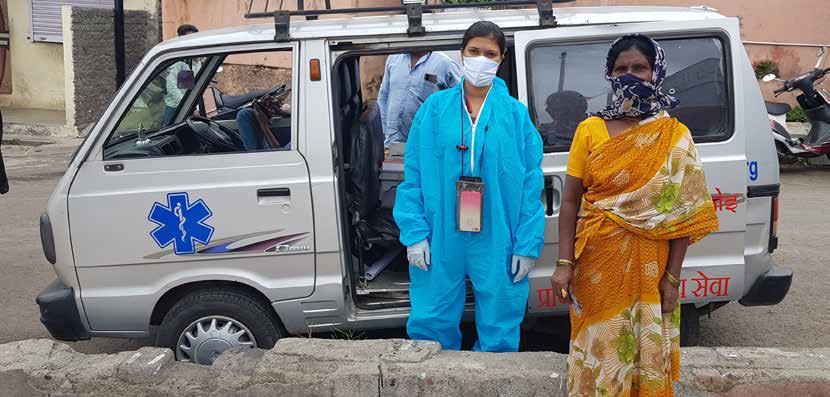
“Through the COVID-19 crisis, it has become apparent that there is tremendous and underutilised opportunity to leverage existing microfinance institution communities to provide access to essential health services and ensure lives are saved,” said Scott Walters, CEO of Opportunity.
As the situation in India started to improve, in late 2021, these health initiatives were rolled out to Indonesia and Nepal to address urgent needs for vaccinations and oxygen concentrator distribution and help meet the escalating needs.
As Indonesia was hit hard by worsening COVID-19 case numbers in August 2021, we mobilised our microfinance partners across Indonesia delivering education on prevention, transmission and management of COVID-19 to more than one million households with training modules available in English and Bahasa. Oxygen concentrators were delivered to public hospitals with a high burden of COVID-19 cases, and vaccinations to over 12,000 people in underserved West Java, of whom 8 per cent were young people with special needs.
With the help of existing Community Health Leaders, trained through our health programs, education and training on COVID-19 prevention and misinformation reached communities across Indonesia, including those in regional areas.
In Nepal, over 50 of our microfinance institutions reached one million households with education on COVID-19 prevention, transmission and training available in English and Nepali.
In 2022, the program now moves from COVID response to COVID resilience. We aim to help families and communities recover from the devastation of 2021 by equipping locallyled COVID-19 prevention efforts in India. The community infrastructure will become more effective and trusted, and families living in poverty will become more resilient in their recovery after COVID-19.
In addition to small business loans and ongoing health programs equipping Health Leaders at a local level, Opportunity is investing in three key areas to improve access and opportunities for families in need.
This award-winning public-private partnership uses our existing microfinance partners to mobilise people across Asia to be vaccinated, particularly in marginalised and rural communities.
A new initiative, the Social Protection Program helps vulnerable, often illiterate individuals navigate and unlock social support payments available to marginalised groups.
This new partnership aims to place unemployed and disadvantaged youth in vocational training for in-demand career paths, not only boosting vital areas of the workforce in India and Indonesia, but also providing income and meaningful employment for the next generation to lift themselves out of poverty.
The Opportunity Challenge is an innovative fundraising challenge aimed at school students to empower and educate them about fighting global poverty.
Starting with a small loan from their parents, students are encouraged to start their own micro-business and make their money grow.
With the income they earn from their business they then pay back the original loan and donate the profits to Opportunity so that together, they can help families in developing countries start their own small businesses, earn incomes, and leave poverty behind!
Balcombe Grammar School on the Mornington Peninsula, Victoria, is one school participating in The Opportunity Challenge. For the last seven years, Balcombe has run an innovative, authentic and highly experiential Pop Up Year 9 curriculum program for their students, as their own iteration of The Opportunity Challenge.
The program allows the students to develop practical skills in innovation and entrepreneurship, product design, creative arts, business planning, customer service, financial literacy and problem solving.
The students are trained as baristas to operate a student-run cafe, as well as creating their own products or services to sell at a quarterly community night market.
The students are given a $30 loan from their parents, and they then use that to develop a product or service that they can sell at a ‘market night’- an event that the Balcombe community has embraced. The students donate 30 per cent of their income from market night to Opportunity as a ‘company tax’, they pay back their $30 loan, and they keep the remaining profit.
Alan Wharton is the Humanities Faculty Leader at Balcombe Grammar coordinating the program. “On a night market in March this year, the students raised another $1,000 for Opportunity and they walked away with a feeling of incredible pride and excitement at what they had achieved,” said Alan.
The parallels between the students’ small businesses and the similar philosophy of a small microfinance loan being used to start up a small business and generate funds to alleviate poverty, is not lost on the students, and the school is very proud that over the last seven years it has raised over $21,000 for Opportunity.
Year 9 student Taj wrote songs during the lockdowns last year and created his own CD and album cover for the night market, which he then sold at the market, raising $217
“I love how practical and hands on this program is,” said Taj. “We get to have total student choice over the design and creation of the products we make, and it is wonderful to experience that excitement of getting that first sale at the night market after all the time and effort we have put into our ideas.
“All these skills will be so important to us as we start preparing for our senior years in school, and we’re able to use the experience on our resumes as we look for part-time jobs while we are studying. I’m also so excited that I’ve now launched my track on Spotify and I’m thinking of pursuing a music career.”
-Taj, Year 9 student
Fellow student Leah made hand-sewn pillows and bibs over the nine-week program, and made $568 selling them at the night market.
“I now feel so much more confident in being able to set up my own business and I also feel so proud that through our own hard work and enjoyment we will also be able to make such a difference in the lives of others through our donation to Opportunity,” said Leah.
Alan said the school chose Opportunity as the beneficiary for the donations, as its microfinance philosophy closely matches their own.
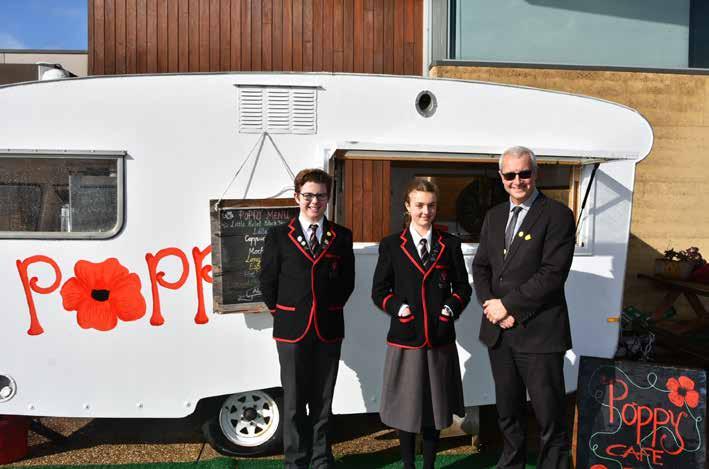
“For a small initial loan investment, an enterprising individual can create a small business which generates income for themselves, they can repay the loan and feel empowered,” said Alan.
The success of the program has gone beyond the school grounds, with a past student creating his business of selling abstract drone photographs over the Mornington Peninsula. After selling out his photos on the Market Day, he expanded the concept and went on to sell his photos at local weekend markets and now has an online business and a future career path in photography.
In Term 3 of 2022, three other Melbourne schools, Fintona Girls School, Camberwell Boys Grammar and Canterbury Girls Secondary College, will be participating in The Opportunity Challenge. These schools will come together to work in small groups to plan and implement their income-generating business ideas, mimicking the microfinance model. Once the students have repaid their small start-up loans, their profits will be donated to Opportunity.
The Opportunity Challenge was originally called Projec10, and the concept was developed by a small group of Opportunity Ambassadors in Melbourne. They were passionate about engaging young Australians in social justice and entrepreneurship, and empowering and equipping them to be long-term change-makers in their world.
If your school would like to get involved in The Opportunity Challenge and raise money for Opportunity whilst teaching students about poverty, international development, microfinance and business, we’d love to hear from you. Visit our website for more information https://opportunity. org.au/join-a-community/opportunity-challenge
Opportunity International is proud to be part of a new study, launched on 1 June 2022, which shows that Opportunity clients benefit from increased quality of life, improved healthcare, education and nutrition.
60 Decibels, a global, tech-enabled impact measurement company, interviewed 18,000 clients across 72 microfinance institutions (MFIs) in 41 countries in early 2022, including over 2,000 of Opportunity’s clients across nine partners. The study, for the first time, gives standard, comparable outcomes data for the microfinance industry. Opportunity partner Cashpor, based in India, is one of the higher performing MFIs included in the study.
The study found that microfinance:
• Does a good job of reaching people without access to financial services
• Improves the quality of life of clients, typically through increased business income and improvement in household outcomes (access to health, education, quality meals and home improvements)
• Improves the ability of clients to deal with economic shocks.
For Opportunity’s nine participating partners the study showed that:
• Clients reported greater resilience as a result of the financial services that they receive, with over 80 per cent of Opportunity clients better able to manage their finances and most clients reported that their ability to meet unexpected expenses improved as a result of the support they had received from the Opportunity partner.
• Over 80 per cent of Cashpor clients experienced an increase in business income
• A majority of clients at each of the nine partners reported increased business income, an increased ability to manage finances, and improved capacity to cope with unexpected economic shocks.
We are excited to see how our programs are helping those most in need and the positive outcomes that result. We also value the extensive feedback from our clients, which helps us understand where we can work with our partners to improve our services, address client challenges and more effectively serve those most in need.
To learn more about the study, visit app.60decibels.com/mfi-index
Below: Loan recipients like Prabhaben in India have improved their quality of life.
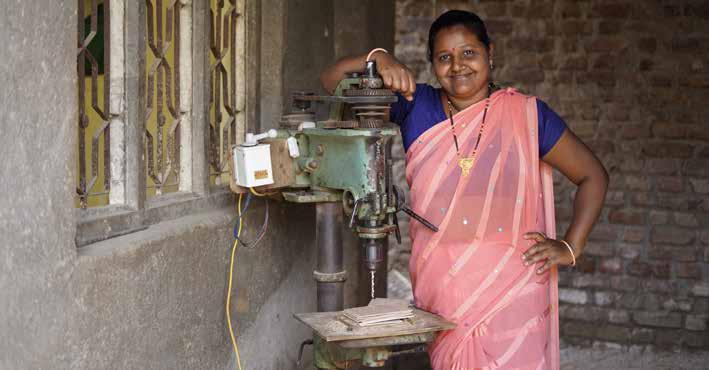
For Philomina and her family, that’s the reality. Philomina, Walter and their two daughters live on just $131.50 a month. This kind of poverty meant moving to a home on the edge of a rubbish dump in Nagpur, India.
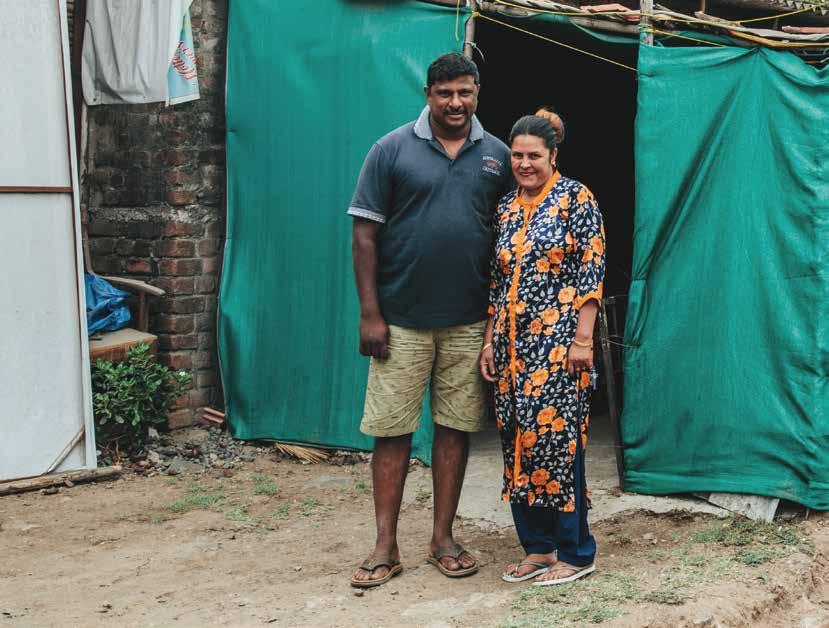
In what could be considered the family’s front yard, sit piles of junk and broken-down cars. The house itself is a makeshift structure made from tarps and bamboo – there are only two rooms. Inside, Philomina has done everything she can to make it a home, but it is not a home they ever imagined themselves living in.
You can help families like Philomina’s lift themselves out of poverty.
You can donate by scanning the QR Code or visiting opportunity.org.au

Opportunity International Australia is an Australian Council for International Development (ACFID) Member and is committed to full adherence to the ACFID Code of Conduct.
Opportunity International Australia receives support from the Australian Government through the Australian NGO Cooperation Program (ANCP).
Opportunity International Australia is a member of the Australian Disability and Development Consortium (ADDC). The ADDC is a network of agencies, organisations and individuals with an interest in disability-inclusive development within Australia and internationally.
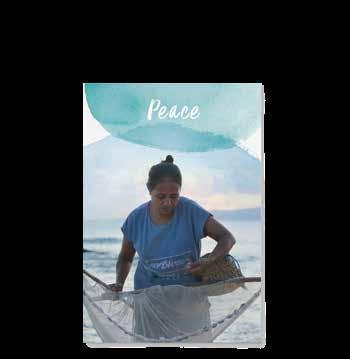
Are you looking to send a card with meaning to a friend or loved one?
Purchase a bundle of Opportunity Greeting Cards online today! Your support will enable us to continue to reach out to families in poverty.
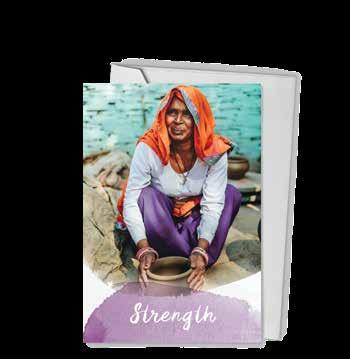
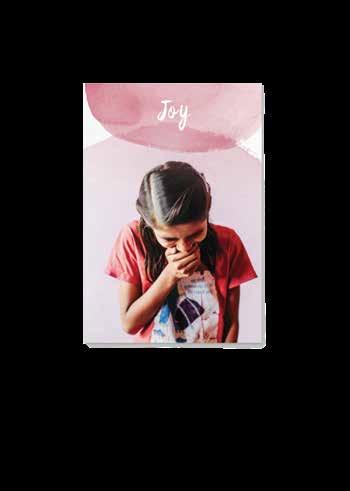
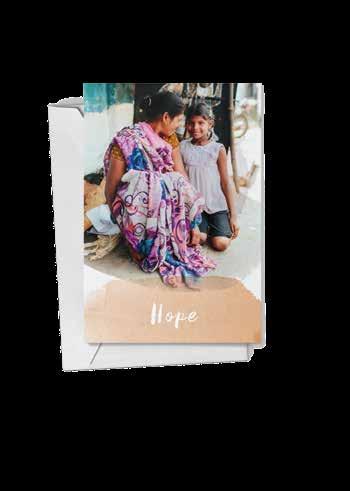
The cards will also bring hope, joy, strength and peace to the families we serve because of you!
Starting at just $20 for a pack of four cards, each card is suitable for use at any time of the year.
facebook.com/OpportunityAUS instagram.com/OpportunityAUS twitter.com/OpportunityAUS linkedin.com/company/OpportunityAUS
